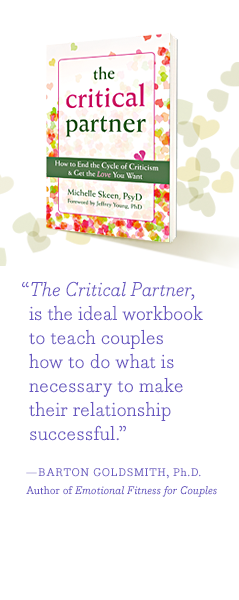Quick Schema Quiz for the Vulnerable Partner
This is an abbreviated schema quiz designed to give you an idea of what you can expect from the longer schema questionnaires that are in The Critical Partner.
What is Your Early Maladaptive Schema?
Adapted from the Young Schema Questionnaire with the permission and assistance of Jeffrey Young, Ph.D, the following statements are designed to help you identify your early maladaptive schema. Try to rate the statements from an honest and undefended place.
Rating Scale
1 = completely untrue
2 = mostly untrue
3 = slightly more true than untrue
4 = moderately true
5 = mostly true
6 = absolutely true
Statement
1. I let other people control me and my life.
2. I give more to others than they give to me.
3. If I put myself first, I feel guilty.
4. I have secrets that I will not share, even with the people closest to me.
5. I present a false self that hides the real me because the real me is unacceptable.
6. Exposure of my faults is one of my greatest fears.
7. I have the expectation that people will hurt me or use me.
8. People will take advantage on me if I am not careful.
9. I regularly set up tests for people to determine if they are on my side.
10. I don’t get as much love as I need.
11. I am usually attracted to cold partners who can’t meet my needs.
12. I feel as if no one really understands me.
13. I get clingy with people when I feel that they are going to leave me.
14. I find myself falling in love with people who aren’t capable of committing to me or willing to do so.
15. People have always moved in and out of my life.
Scoring:
If you rated statements 1, 2 or 3 with a 3 or higher you may have a subjugation schema.
The core emotions of vulnerable partners with a subjugation schema are fear, anxiety, and depression. The core behavior of these people is that they take care of other people before they take care of themselves, and they allow themselves to be controlled by their partners or significant others. Their worldview is that the needs and wants of others come before their own needs and wants, they matter less than others do, and it is bad for them to have their own needs and desires. People who are driven by this schema are drawn to dominant, controlling partners–and they are compliant.
If you rated statements 4, 5 or 6 with a 3 or higher you may have a defectiveness and shame schema.
The core emotions of vulnerable partners with a defectiveness and shame schema are shame and fear. These people’s core behaviors are that they are self-conscious and compare themselves to others. Their worldview is that they are defective, bad, unwanted, inferior or invalid. The coping behaviors associated with someone who is surrendering to this schema are to choose critical partners and to be self-critical as well.
If you rated statements 7, 8 or 9 with a 3 or higher you may have a mistrust and abuse schema.
The core emotions of vulnerable partners with a mistrust and abuse schema are fear and anxiety. These people’s core behavior is to be guarded and suspicious, and their worldview is that people cannot be trusted. The coping behavior of people who surrender to this schema is to choose unpredictable and untrustworthy partners. While it seems paradoxical that someone who believes that people can’t be trusted would make the unconscious choice of an untrustworthy partner, it serves to reinforce what the vulnerable partner believes to be true.
If you rated statements 10, 11 or 12 with a 3 or higher you may have an emotional deprivation schema.
The core emotions of vulnerable partners with an emotional deprivation schema are loneliness, bitterness, disappointment, and depression. Their core behaviors are avoiding asking for their needs to be met and acting as if they do not have needs. Their worldview is that others will not meet their needs. The coping behaviors of people who have surrendered to this schema are to choose cold and detached partners.
If you rated statements 13, 14 or 15 with a 3 or higher you may have an abandonment schema.
The core emotions of vulnerable partners with an abandonment schema are anxiety, sadness, depression, and anger. Their core behavior is to cling to their partners, and their worldview is the belief that people close to them will leave them, get sick and die, or behave unpredictably. The coping behavior of people who are surrendering to this schema is to choose partners who are unpredictable or unavailable. This typical partner choice seems counterintuitive for people with this type of life experience, but they are drawn to what they know and are giving in to their schema.
Take the schema quizzes in The Critical Partner for a complete and accurate assessment and interpretation of your schema and your critical partner’s schema.

